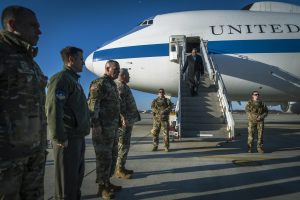U.S. Secretary of Defense Lloyd Austin had a meeting with his South Korean counterpart, Lee Jong-sup, in Seoul on Tuesday. The two defense chiefs reaffirmed the alliance’s joint commitment in response the North’s growing missile threats.
“During the meeting, the two leaders strongly condemned the Democratic People’s Republic of Korea’s (DPRK) continued provocations and violations of United Nations Security Council resolutions, including its missile launches and recent drone incursions,” the joint statement said.
The meeting between Austin and Lee came two months after they held the 54th United States-Republic of Korea (ROK) Security Consultative Meeting (SCM) in Washington, D.C. in November. (Republic of Korea is the official name of South Korea.)
Celebrating the 70th anniversary of the South Korea-U.S. alliance, the two sides agreed to “enhance the implementation of U.S. extended deterrence to underscore the U.S. security commitment” to South Korea.
“As agreed upon during the ROK-U.S. Summit in May 2022 and the 54th Security Consultative Meeting, the two leaders emphasized that the two nations will continue to bolster the Alliance’s capabilities to deter and respond to DPRK nuclear and missile threats, as well as to enhance information sharing, joint planning and execution, and Alliance consultation mechanisms,” the joint statement said.
Amid stalled nuclear talks with North Korea, South Korea and the United States agreed to scale up joint military drills.
The South Korean and U.S. militaries will hold the “Deterrence Strategy Committee Table-top Exercise” in February to facilitate their responses over the North’s nuclear threat, according to the joint statement. The two sides also “pledged to closely coordinate in order to continue to deploy U.S. strategic assets in a timely and coordinated manner in the future.”
During the joint press conference, Austin implied that U.S. strategic assets – for example, fifth generation aircraft such as the F-22 and F-35 or an aircraft carrier strike group – will be more present in the region going forward. The United States mobilized the carrier USS Ronald Regan for joint military drills in South Korea in late September 2022, the first such deployment since 2017. North Korean Foreign Ministry denounced the move, calling it a serious threat to the stability of the Korean Peninsula.
The joint military drills between Seoul and Washington are one of the main “hostile policies” that Pyongyang says must be permanently suspended before it will consider a return to talks.
Seoul and Washington concurred that extensive deterrence measures are necessary to deter the North’s nuclear and missile threats. In other words, the two sides agreed that their strategy to tackle North Korean missile threats should be based on a “strength to strength” approach. There appears to be no new strategy at hand to pursue negotiations.
To show the united stance of the United States and its allies over the North’s missile threats, the two sides discussed measures to strengthen the South Korea-U.S.-Japan trilateral security cooperation. They also “agreed to hold Defense Trilateral Talks at the earliest opportunity,” demonstrating Washington’s strategy to tackle Pyongyang’s nuclear and missile development through cooperation with Seoul and Tokyo.
As North Korea has been accused of completing preparations to conduct a seventh nuclear test, South Korea and the U.S. are gearing up to consolidate their military alliance to manage the instability on the Korean Peninsula. However, as South Koreans’ support for their country developing indigenous nuclear weapons – rather than redeploying U.S. nuclear weapons on Korean soil – continues to grow, Seoul and Washington would need to materialize the U.S. extended deterrence in a timely manner to assure South Koreans that the U.S. security guarantee is reliable.

































